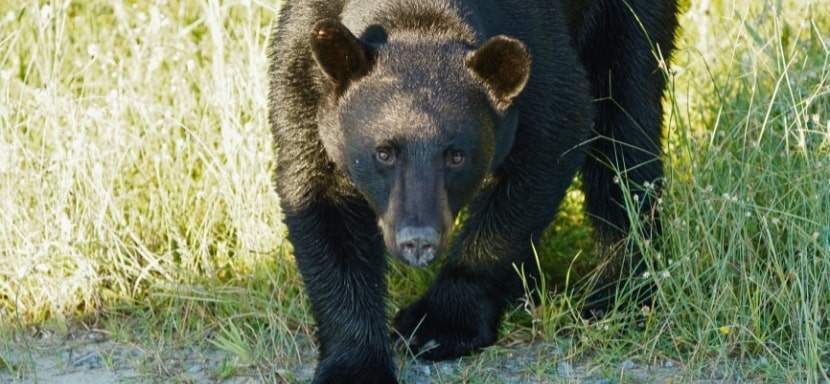How to Survive a Bear Attack

Bear Attack Survival Tips and Strategies
Though rare, bear attacks can occur because bears remember food locations for years and may silently track humans to assess threats or follow scents.
Surviving a bear attack involves more than just reacting during an encounter; it requires understanding bear behaviors, implementing proactive safety measures, and mastering defensive tactics. Familiarity with bear body language can help assess their intentions, while preventive strategies like making noise and managing food waste can minimize the risk of an encounter. Should a confrontation occur, knowing whether to stand still, use bear spray, or play dead, depending on the bear type, is critical.
- Bear Behavior Awareness: Recognize bear signs to interpret their intentions.
- Preventive Strategies: Use noise, manage food, and stay alert to reduce bear encounters.
- Defensive Responses: Based on the bear’s type and behavior, know when to use bear spray or play dead.
Understanding Bear Behavior
It’s super important to get why bears act the way they do. By knowing what sets them off, you can keep both you and the bears out of trouble.
Why Bears Attack
Bears usually keep to themselves, but they can get defensive fast. They might lash out if they feel scared or surprised or need to protect their babies or food. Figuring out what freaks them out can help you stay safe.
Different Types of Bears and Their Behaviors
- Black Bears: These guys are curious and might just come to check you out. They’re looking around to see if you’ve got any food they like.
- Grizzly Bears: A bit tougher, these bears don’t back down easily. They might fake-charge to intimidate you if they feel threatened.
- Polar Bears: Watch out for these. They’re dangerous hunters by nature and are likelier to see you as a snack, especially in the Arctic.
Reading Signs of Aggression
Knowing how to read a bear’s body language can make a big difference when you’re in bear country. Seeing a bear stand on its hind legs is often misunderstood; they might just be trying to get a better look around or sniff something interesting in the air. This isn’t them being aggressive—it’s more about curiosity.
Actual signs of aggression are a bit more noticeable and can include a bear making loud noises, swatting the ground with its paws, or even performing bluff charges—where they charge at you then stop short to scare you off rather than to make contact. These behaviors are clear warnings that a bear feels threatened and is ready to defend itself if necessary.
Preventative Measures Before a Bear Encounter
Are you planning on an adventure into bear country? Let’s make sure you’re set up for a safe trip. Here’s how you can keep those furry giants at a friendly distance.
Planning and Preparation
First, get the lowdown on the latest bear movements in the area you’ll be exploring. Don’t forget to pack bear spray and, more importantly, know how to use it quickly if needed.
Avoiding Bear Encounters
- Make Some Noise: Sing, talk, or clap your hands while hiking. It helps you avoid surprising a bear.
- Stick Together: Bears tend to keep their distance from larger groups. So, the more, the merrier!
- Stay Sharp: Look in the thick bushes or near rivers where bears might hang out.
Proper Food Handling in Bear Country
- Store Smart: Use bear-proof containers for your food. It’s the best way to keep smells contained.
- Keep Your Camp Clean: Always cook and eat a reasonable distance from your sleeping destination. You don’t want those cooking smells to invite bears over!
Did You Know?
Bears have an incredible sense of smell, over 2,100 times more sensitive than humans. This keen olfactory ability allows them to detect food sources from miles away and even track down scents several days old!
What to Do If You Encounter a Bear
So, you’re out in the wild and suddenly spot a bear. No panic! Here’s what you need to know to handle the situation smoothly.
If a Bear Has Not Noticed You
First, keep calm and do not turn your back or run. Slowly start moving backward while making sure you can still see the bear. This way, you’re not startling it, which is critical. Remember, running or sudden moves might make the bear think it’s a game of chase—and trust me, that’s a game you won’t win.
If a Bear Approaches You
If the bear has seen you and starts coming closer, this is your moment to stand firm. Keep your feet planted and avoid making direct eye contact; watch the bear indirectly, as direct eye contact can be perceived as a threat.
Talk to the bear in a calm but confident voice. Tell the bear you’re a human (as if he cares, right?). But really, it’s about letting the bear know you’re not prey. You want to communicate that you’re not a threat but not something to be messed with. This can sometimes make the bear reconsider and keep its distance.
Utilizing Bear Spray
Bear spray should be an accessible tool during any bear encounter. If a bear approaches within your immediate space, deploy bear spray according to manufacturer instructions to deter the bear.
How to Survive a Bear Attack
Okay, let’s talk about the scary stuff. If a bear decides you’re on today’s menu, here’s what you can do to increase your odds of walking away unscathed.
Differentiating Defensive and Predatory Attacks
- Defensive attacks usually occur because a bear feels threatened. Here, playing dead can dissuade further attacks. Lie on your stomach, cover your neck, and remain motionless until the bear leaves.
- Predatory attacks are rare and require you to fight back. Target the bear’s face and eyes.
Using Non-Aggressive Defense Tactics
If it looks like a bear is making a beeline for you, remember two things: don’t run, and get ready with your bear spray.
Why not run? Bears are like the sports cars of the animal kingdom when it comes to speed, and you’re not going to outrun them. When it gets close—about 20-30 feet away—give it a good spray in the face. This can help deter the bear and allow you to move safely away.
Defensive Strategies Against Black Bears
If you’re dealing with a black bear, showing some backbone might make it back off. If a black bear gets aggressive, try to fight back.
Use whatever you have—sticks, rocks, your fists. Aim for the face. It sounds scary, but black bears often decide it’s not worth the trouble if you put up a good fight.
Defensive Strategies Against Grizzly Bears
Grizzlies? They’re a different story. If a grizzly bear attack keeps going, your best bet is to play dead. Lie flat on your stomach to protect your vitals, and cover your neck with your hands.
Keep as still as possible, and don’t get up until you’re sure the bear has lost interest and moved away. This could save your life by showing the bear you’re not a threat.
Dealing with a Polar Bear Attack
Polar bears are the most dangerous to humans because they’re not just defensive—they’re hunters.
If you encounter a polar bear, use your bear spray to try to stop it, and immediately look for a safe, enclosed shelter. Fighting back should be your absolute last resort.
If it comes down to it, fight with everything you’ve got, focusing on hitting the bear’s face and eyes.
After a Bear Encounter
Phew, you made it through! But hold up, we’re not done just yet.
Assessing Injuries and Seeking Help
First thing first: check yourself for injuries. Did you get scratched, bitten, or hurt while making your getaway? Check it out, even if it’s a tiny cut or bruise. You’d be surprised how quickly a minor injury can become a significant problem if treated incorrectly. Don’t hesitate to call for medical help or head to the nearest clinic if anything feels off. Better safe than sorry, right?
Reporting the Encounter
Once you’re safe and patched up, report the encounter to the local wildlife officials. They need to know what went down so they can monitor bear movements and behavior, which helps them manage the bear population. Your report could help them make the area safer for others, preventing future close calls or attacks. A quick call or visit to their office can make a big difference.
Long-Term Strategies for Bear Country Safety
Heading into bear country isn’t just a walk in the park—you must stay sharp and prepare properly to ensure your outdoor adventures don’t include a bear encounter. Here’s your guide to keeping it safe over the long haul.
Preparing for Outings
Before you even lace up your hiking boots, do some homework. Check out the latest reports on bear activities in the area. Knowing if there’s been a lot of bear sightings can help you choose a safer route or prepare better. And don’t forget the bear spray—it’s your best friend in a pinch. Take some time to learn about the types of bears you might come across, too. Understanding their behavior could be a real game-changer.
Setting Up Camp Safely
Once you’re ready to set up camp, think like a bear—where would you sniff out some snacks? Keep your food in bear-proof containers and store them away from where you sleep. The same goes for your trash—make sure it’s sealed up tight and out of reach. Bears have noses that can smell food from far away, so keeping your eating and sleeping areas separate is critical.
Staying Alert
While you’re out there, keep your eyes peeled and your ears open, especially in thick brush or near noisy streams where a bear might not hear you coming. Making noise can help a lot. Talk loudly, sing, or consider carrying a bear bell. These sounds can let a bear know you’re around, allowing it to steer clear of you, which is best for everyone involved.
FAQs About Bear Attacks
What should I do if I see a bear while hiking?
How effective is bear spray in a bear attack?
Can playing dead during a bear attack save your life?
What are the best ways to store food in bear country?
Use airtight containers and store all food items away from your campsite.
Is it safe to run away from a bear?
What are the signs of an aggressive bear?
Conclusion: Essential Safety Tips for Coexisting with Bears in the Wild
Navigating bear country safely requires a blend of preparation, awareness, and respect for wildlife. By understanding bear behavior, implementing preventative measures, and knowing how to respond in an encounter, you can significantly reduce the risks associated with these majestic but potentially dangerous animals.
Always prepare for outings by checking bear activity, carrying bear spray, and educating yourself about the local bear populations. Practice safe camping habits by storing food and waste properly, and stay vigilant on your hikes by making noise and staying alert. Reporting any encounters helps wildlife officials manage populations and maintain safety for all.
Embrace these practices not only to protect yourself but also to preserve the natural harmony of bear habitats. This guide offers the knowledge and strategies to enjoy the great outdoors while coexisting safely with bears.
Interesting Facts About Bears
Here are some interesting and uncommon facts about bears. From their exceptional sensory abilities to their surprisingly varied diets and impressive physical skills, these facts illuminate the complex and captivating nature of bears in the wild.
- Superb Sense of Smell: Bears have one of the most powerful olfactory abilities in the animal kingdom, detecting food, cubs, and potential threats from miles away.
- Not True Hibernators: Unlike true hibernators, bears can wake up and move around their dens during winter, although their metabolism slows significantly.
- Varied Diet: While often considered carnivores, most bear species have an omnivorous diet, with plant material making up a substantial portion of their intake.
- Swimming Skills: Bears are excellent swimmers. Polar bears can swim miles in open water in search of ice floes or prey.
- Tree Climbing Experts: Black bears are particularly adept at climbing trees to escape threats or to find food, whereas giant grizzly bears, due to their size and weight, are more ground-oriented.
- Playful Nature: Bears are known to play and engage in mock fights, which helps young cubs learn survival skills and navigate social hierarchies.
- Longevity: In the wild, bears can live up to 25 years, extending their lifespan further in captivity due to regular meals and medical care.
- Mother-Cub Bond: Bear cubs are born blind and dependent on their fiercely protective mother. Cubs typically stay with their mother for about two years.
- Large Territories: Bears can roam over extensive areas, with territories varying from 40 to over 600 square miles, depending on the species and the environment.
- Unique Paws: Bears walk flat on their feet (plantigrade walking), much like humans, which allows for better grip and mobility in their often rugged habitat.
More Wild Frontier Scenarios
How to Survive a Mountain Lion Attack
Learn how to survive a mountain lion attack with practical steps to protect yourself and stay safe in. Surviving a…
How to Survive a Raccoon Attack
It’s a quiet evening, the moon is out, and maybe you’re taking out the trash or just enjoying a night…
How to Survive a Wild Boar Attack
Encountering a wild boar is like meeting your ex at a grocery store—unexpected, unnerving, and, in most…
How to Survive a Swarm of Bees
Surviving a bee swarm might sound like a scene out of a movie, but it’s a real concern for those who…
How to Survive a Skunk Spray
Getting sprayed by a skunk is a smelly situation that no one wants to find themselves in. However, if…
Recent Survival Posts
How to Survive a Layoff
Layoffs feel personal—even when they’re not. One day, you’re responding to Slack messages and forwarding…
How to Survive a Drug Test
I never imagined I’d be so emotionally invested in a paper cup. But there I was, standing under the fluorescent…
How to Survive an Interrogation
If you’ve ever been caught in the crosshairs of an overly enthusiastic mall cop or stared down by someone…
How to Survive a Nightclub Shooting
Nightclubs pulse with life—lights flashing, music pounding, bodies packed tight on the dance floor. It’s a place to…
How to Survive a Bachelor Party
A bachelor party is a delicate mix of celebration, chaos, and questionable decision-making, wrapped…
More Wild Frontier Survival Scenarios

How to Survive a Raccoon Attack
It’s a quiet evening, the moon is out, and maybe you're taking out the trash or enjoying a night on your porch. And suddenly, out of the shadows, bam! There it is—those black-ringed eyes glowing at you like some creature from a raccoon version of “The Shining.” If...

How to Survive a Wild Boar Attack
Encountering a wild boar is like meeting your ex at a grocery store—unexpected, unnerving, and, in most cases, best avoided. Yet, wild boars aren't interested in your baggage or drama; they're just trying to mind their own business—unless they think you're a threat....

How to Survive a Swarm of Bees
Surviving a bee swarm might sound like a scene out of a movie, but it's a genuine concern for those who love the outdoors. Imagine this: you're hiking on a beautiful sunny day, enjoying the tranquility of nature, when suddenly you hear a low buzzing sound that...

How to Survive a Skunk Spray
Getting sprayed by a skunk is a smelly situation that no one wants to find themselves in. However, if you do end up as a target of this defensive mechanism, knowing how to handle the aftermath can make a huge difference. Let's explore some practical steps and advice...

How to Survive a Cicada Infestation
Cicada Infestation Survival Tips and Strategies Cicadas have fascinated humans for millennia. These insects are known for their distinctive life cycles, particularly the periodical cicadas that emerge in massive numbers every 13 or 17 years. The earliest recorded...
More Survival Scenarios

How to Survive a Layoff
When the Floor Falls Out: The Reality of a Layoff Layoffs feel personal—even when they're not. One day, you're responding to Slack messages and forwarding emails. Next, you're staring at your monitor as it logs you out... for good. Whether it's a restructuring, a...

How to Survive a Drug Test
The Cup, The Room, The Truth I never imagined I’d be so emotionally invested in a paper cup. But there I was, standing under the fluorescent hum of a strip-mall clinic, trying to recall the last time I ate a poppy seed bagel. That’s the thing about drug tests—they...

How to Survive an Interrogation
If you've ever been caught in the crosshairs of an overly enthusiastic mall cop or stared down by someone in a uniform with a clipboard and a glare, you’ve felt it — the chilly fingers of interrogation anxiety. And while most of us imagine interrogation scenes as...

How to Survive a Nightclub Shooting
Nightclubs pulse with life—lights flashing, music pounding, bodies packed tight on the dance floor. It’s a place to escape, feel the rhythm, and lose yourself in the crowd. But that same energy can turn deadly in seconds, transforming a night of fun into one of the...

How to Survive a Bachelor Party
A bachelor party is a delicate mix of celebration, chaos, and questionable decision-making, wrapped in the noble intention of sending the groom off into married life with a night he’ll (hopefully) remember. It’s a ritual as old as time—well, as old as men deciding...

How to Survive Your First Time at the Gym
Walking into a gym for the first time can feel like stepping into an alien world. The machines hum with purpose, the regulars move confidently, and you’re left standing there, clutching your water bottle, wondering whether you’re in the right place—or on the right...

How to Survive a Worldwide Communications Breakdown
Imagine waking up to silence. Your phone doesn’t buzz, your email won’t load, and even your local radio station crackles with static. A worldwide communications breakdown has hit. What next? For many, this doomsday scenario may sound like the opening lines of a...

How to Survive a Flash Flood While Driving
Surviving a flash flood while driving requires quick thinking, calmness, and a solid plan to ensure your safety. Preparation can make all the difference between a close call and a catastrophe in emergencies like this. This guide provides practical advice to protect...

How to Build an Emergency Kit
Emergencies don’t knock politely at the door. They barge in, uninvited, like a distant relative with a penchant for drama, turning your world upside down without warning. Whether it’s a power outage, a natural disaster, or an unexpected evacuation, the key to staying...

How to Protect Yourself From Insects in the Wild
There’s nothing like being out in the wild—birdsong echoing through the trees, the fresh scent of earth, and a deep sense of peace that makes you think, “Ah, this is what life is about.” But then comes the buzzing. Mosquitoes, ticks, and flies swoop in like uninvited...
